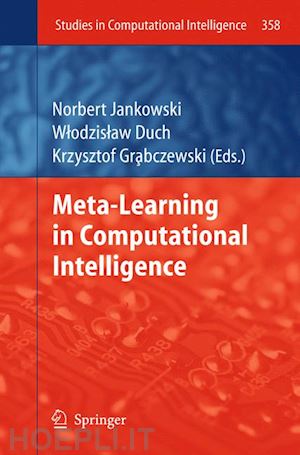

Questo prodotto usufruisce delle SPEDIZIONI GRATIS
selezionando l'opzione Corriere Veloce in fase di ordine.
Pagabile anche con Carta della cultura giovani e del merito, 18App Bonus Cultura e Carta del Docente
Computational Intelligence (CI) community has developed hundreds of algorithms for intelligent data analysis, but still many hard problems in computer vision, signal processing or text and multimedia understanding, problems that require deep learning techniques, are open.
Modern data mining packages contain numerous modules for data acquisition, pre-processing, feature selection and construction, instance selection, classification, association and approximation methods, optimization techniques, pattern discovery, clusterization, visualization and post-processing. A large data mining package allows for billions of ways in which these modules can be combined. No human expert can claim to explore and understand all possibilities in the knowledge discovery process.
This is where algorithms that learn how to learnl come to rescue.
Operating in the space of all available data transformations and optimization techniques these algorithms use meta-knowledge about learning processes automatically extracted from experience of solving diverse problems. Inferences about transformations useful in different contexts help to construct learning algorithms that can uncover various aspects of knowledge hidden in the data. Meta-learning shifts the focus of the whole CI field from individual learning algorithms to the higher level of learning how to learn.
This book defines and reveals new theoretical and practical trends in meta-learning, inspiring the readers to further research in this exciting field.
Universal meta-learning
architecture and algorithms.-
Meta-learning of instance
selection for data
summarization.-
Choosing the metric: a simple
model approach.-
Meta-learning Architectures:
Collecting, Organizing and
Exploiting Meta-knowledge.-
Computational intelligence for
meta-learning: a promising
avenue of research.-
Self-organization of supervised
models.-
Selecting Machine Learning
Algorithms Using the Ranking
Meta-Learning Approach.-
A Meta-Model Perspective and
Attribute Grammar Approach to
Facilitating the Development of
Novel Neural Network Models.-
Ontology-Based Meta-Mining
of Knowledge Discovery
Workflows.-
Optimal Support Features for
Meta-learning.











Il sito utilizza cookie ed altri strumenti di tracciamento che raccolgono informazioni dal dispositivo dell’utente. Oltre ai cookie tecnici ed analitici aggregati, strettamente necessari per il funzionamento di questo sito web, previo consenso dell’utente possono essere installati cookie di profilazione e marketing e cookie dei social media. Cliccando su “Accetto tutti i cookie” saranno attivate tutte le categorie di cookie. Per accettare solo deterninate categorie di cookie, cliccare invece su “Impostazioni cookie”. Chiudendo il banner o continuando a navigare saranno installati solo cookie tecnici. Per maggiori dettagli, consultare la Cookie Policy.